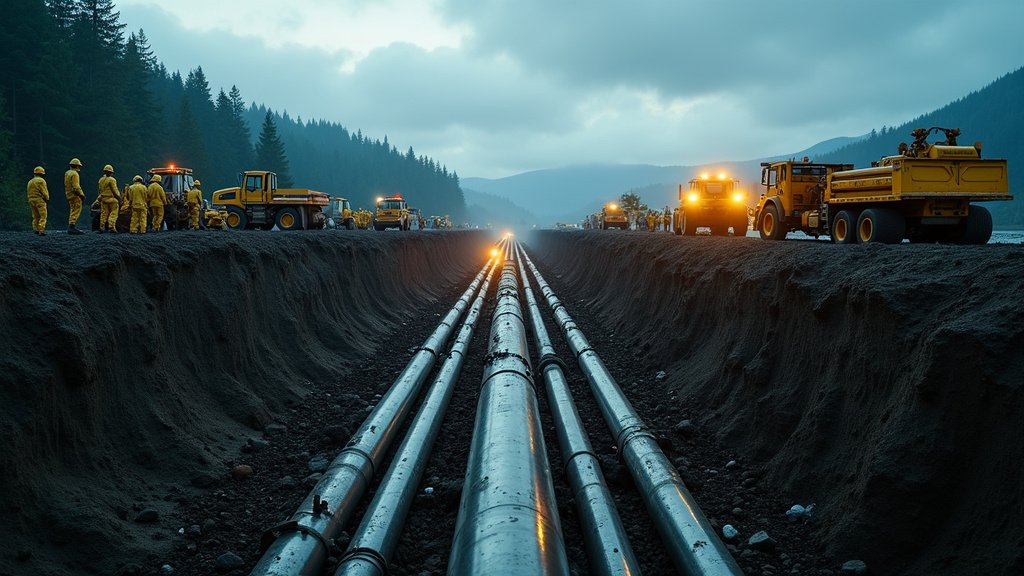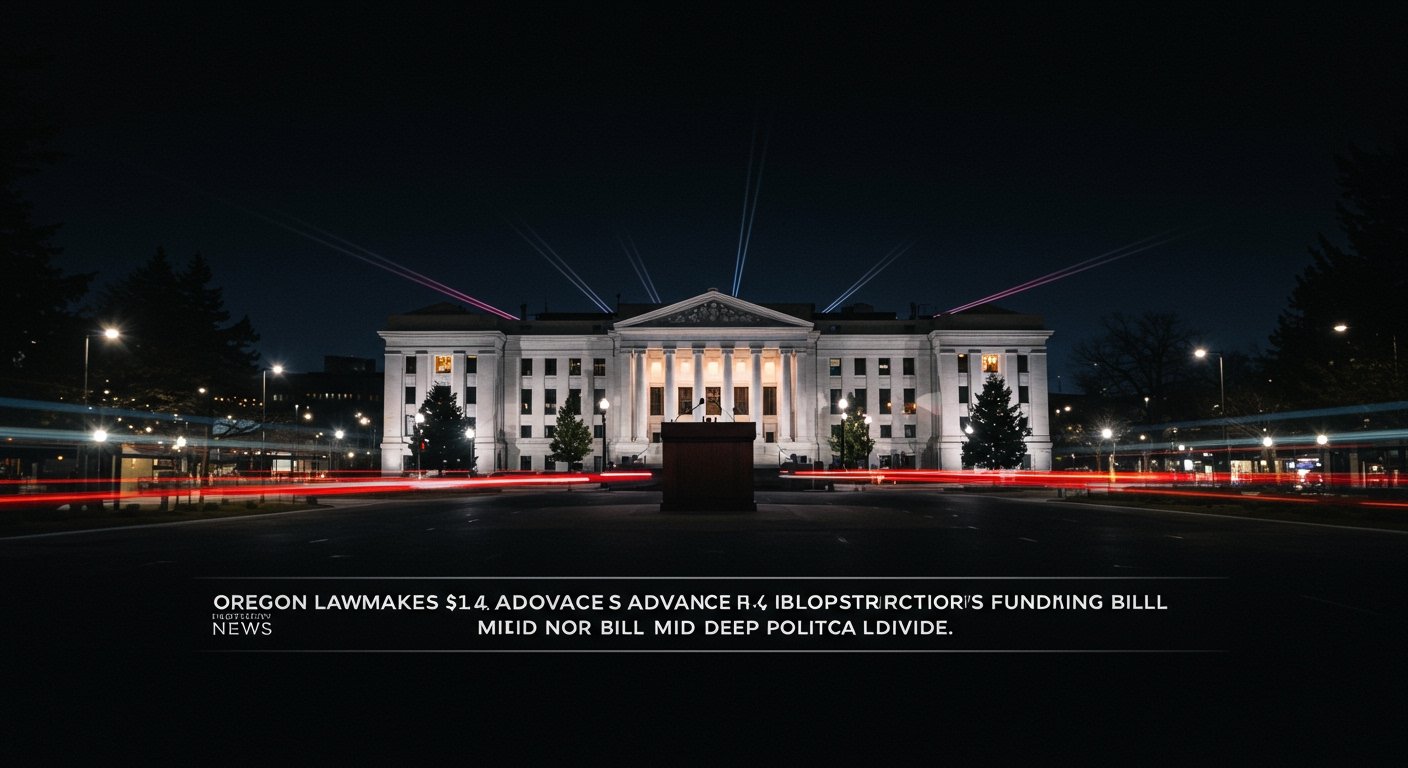PORTLAND, Ore. – Oregon Governor Tina Kotek has declared a state of emergency to ensure the continued arrival of adequate fuel supplies across the state, following a critical shutdown of the Olympic Pipeline due to a leak. The proactive measure, announced on Monday, November 24, 2025, aims to mitigate potential disruptions to Oregon’s primary fuel artery as the busy Thanksgiving travel season gets underway, highlighting the impact of the Olympic Pipeline leak.
The Olympic Pipeline, a vital infrastructure carrying over 90% of Oregon’s transportation fuel from refineries in Washington state, has been non-operational for nearly two weeks. The shutdown was initiated after a leak was discovered near Everett, Washington, prompting extensive repair efforts by operator BP Pipelines North America. Crews have been working around the clock, excavating significant sections of the 400-mile pipeline, but an estimated timeline for its full restoration remains uncertain. This ongoing Olympic Pipeline leak disruption has triggered emergency declarations in both Oregon and Washington.
Governor Kotek’s Emergency Directive Addressing the Olympic Pipeline Leak
Governor Kotek’s executive order empowers state agencies to coordinate a comprehensive response, prioritizing the consistent delivery of essential fuel, directly impacted by the Olympic Pipeline leak. The declaration allows for the waiving of certain regulations for commercial drivers transporting fuel. This critical adjustment enables fuel truckers to operate for extended hours, facilitating the increased use of alternative delivery methods such as ships and trucks to replenish the state’s fuel reserves and manage the Oregon fuel supply.
“Oregon is not experiencing supply constraints currently,” stated Governor Kotek’s office in a news release, emphasizing that the emergency declaration is a precautionary step. While officials do not anticipate widespread shortages, they caution residents that the reliance on more expensive alternative transport methods could lead to increased prices at the pump, a potential consequence of the fuel pipeline disruption. The governor’s office also reiterated that price gouging during an emergency is unlawful and encouraged reporting of any violations to the Oregon Department of Justice.
The state of emergency is slated to remain in effect until December 24, 2025, unless rescinded or extended by the Governor. The Oregon Department of Emergency Management (OEM), the Oregon Department of Energy (ODOE), and the Oregon Department of Transportation (ODOT) are actively involved in managing the response, assessing fuel levels, and coordinating logistics to counter the effects of the Olympic Pipeline leak.
The Olympic Pipeline: A Critical Artery and the Recent Olympic Pipeline Leak
The Olympic Pipeline is the backbone of the liquid fuels supply chain for the Pacific Northwest, transporting gasoline, diesel, and jet fuel from refineries in northwest Washington to distribution terminals in western Washington and Oregon. In Oregon, fuel typically arrives at terminals in the Portland area and is then distributed throughout the state, including to Eugene and the Portland International Airport (PDX). The vulnerability of relying on a single major pipeline has been highlighted by this Olympic Pipeline leak incident.
BP Pipelines North America has confirmed that excavation and inspection of the pipeline are ongoing. While a 16-inch segment was briefly restarted, a leak in a 20-inch segment necessitated another shutdown, halting all refined product deliveries. The company has stated that over 200 feet of the pipeline have been excavated for inspection, but a definitive restart schedule for the Olympic Pipeline has not yet been provided.
Ripple Effects in Washington and Beyond from the Fuel Pipeline Disruption
The Olympic Pipeline’s shutdown is also significantly impacting neighboring Washington. Governor Bob Ferguson previously declared a state of emergency to address fuel delivery challenges, particularly for jet fuel at Seattle-Tacoma International Airport (Sea-Tac). The airport, which heavily relies on the pipeline for its fuel supply, has seen airlines like Alaska Airlines and Delta Air Lines implement contingency plans. These plans include tankering extra fuel on inbound flights, expanding trucking operations, and adding refueling stops to flights to prevent Thanksgiving travel fuel disruptions for the millions of travelers expected during the Thanksgiving holiday.
Reports indicate that while Sea-Tac has so far avoided major disruptions, the situation remains dynamic. The waivers in Washington for commercial drivers are designed to expedite jet fuel deliveries to the airport, ensuring it can meet federally mandated fuel-management requirements during this Washington fuel emergency.
Preparing for the Long Haul Amidst the Olympic Pipeline Leak
This incident underscores Oregon’s dependence on a single major pipeline for its fuel needs. Unlike states with multiple pipelines or diversified delivery networks, Oregon’s infrastructure is heavily linked to the Olympic Pipeline. While contingency plans and alternative transportation methods are being employed, the extended duration of the Olympic Pipeline’s outage presents ongoing challenges for the Oregon fuel supply.
State energy and emergency management officials are closely monitoring fuel levels and coordinating with Washington and industry partners. The situation serves as a stark reminder of the fragility of energy supply chains and the importance of robust emergency preparedness plans for critical infrastructure. As repair efforts continue, the focus remains on ensuring a stable fuel supply for Oregonians and mitigating the economic impacts of this significant Olympic Pipeline leak disruption.




